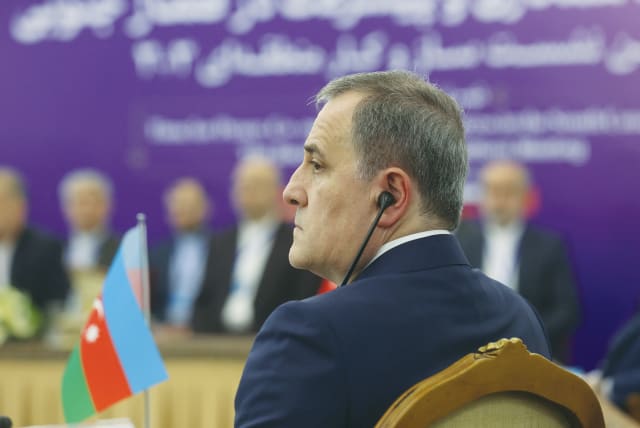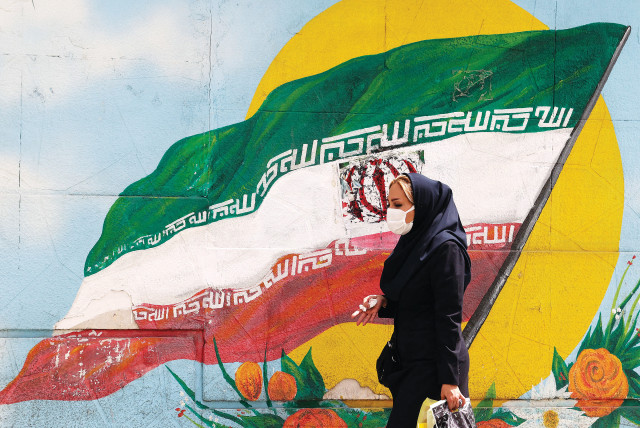The Iranian cultural coercion of Azerbaijan doesn't respect the country's security - opinion

Everyone must praise Sevinc Gülmammadova for taking a brave stance against Iran’s compulsory hijab laws by refusing to placate the mullahs in the center of Baku.
In recent days, Iran’s Ambassador to Azerbaijan, Abbas Mousavi, was compelled to resign after Baku TV’s female presenter Sevinc Gülmammadov interviewed him while not wearing a hijab. In Iran, many supporters of the regime were outraged that a female journalist would conduct an interview inside the Iranian Embassy without wearing a hijab and voiced their disdain by punishing Mousavi. However, their criticism of Gulmammadova for not wearing a hijab just highlights how much the Iranian regime oppresses women in general and female journalists in particular.
Female journalists should never be compelled to wear the hijab, especially when they conducting an interview in the center of Baku and not in Iran. The fact that the interview was conducted inside the Iranian Embassy, which is under the sovereignty of the Islamic Republic of Iran, makes no difference. Nobel Prize winning human rights lawyer, Shirin Ebadi, claimed that the law of compulsory hijab violates Iran’s Constitution. Article 23 of the Iranian Constitution states: “The investigation of the beliefs of persons is forbidden and no one may be molested or prosecuted for holding a belief.”
Alireza Asgari wrote in an article titled “Compulsory Hijab in Iran: Women’s Choice or a State Demand?” “One of the implications of such an article is that women should be free to choose their own religion, beliefs, and opinions and be able to practice (or not) certain religious acts including the wearing (or not) of the Islamic Hijab or any other type of dress code. Whereas in the constitution people are granted the right to choose their religion and consequently religious practices, the Islamic Penal Code which legislates in favor of compulsory Hijab violates the right of women to freedom of religion and religious practices including Hijab.”
In the past, Gülmammadova has interviewed ambassadors from the UAE and Pakistan, both conservative Muslim countries, without encountering criticism for the way she dresses. However, the interview with Mousavi, conducted with portraits of Iran’s supreme leaders and the late military commander Qasem Soleimani in the background, was deemed by some supporters of the regime as a violation of diplomatic protocols and blatant disrespect to Iranian officials.
Anyone who understands Azerbaijani culture would not take it this way. If one goes to Baku, one will find that most women do not wear the hijab unless they enter the Heydar Aliyev Mosque or another Muslim place of worship. Female journalists especially tend to don Western attire in Baku, always preferring the latest Parisian fashions to traditional Islamic attire. In fact, I would even say that Azerbaijani professional women like to compete with the Europeans regarding who can wear the most fashionable Western professional clothing. For them, donning a hijab while doing important professional work is just out of place.
Female Iranian journalists attacked
OF COURSE, Iran is not a country that is known to respect the human rights of journalists, especially female journalists. According to the Committee to Protect Journalists, last month, “security forces raided the newsroom of the privately owned multimedia economic news website FardayeEghtesad in Argentina Square in the capital, Tehran, detained all 30 staff inside the building, searched the newsroom and confiscated everyone’s cellphones and other electronic devices, such as laptops. Five journalists were detained in the newsroom for four days.”
Pouria Zeraati, an Iranian journalist and TV presenter at Iran International, was stabbed in front of his home in London recently. The channel’s spokesman, Adam Baillie, reported the journalist was the victim of “serious death threats” and that Zeraati was “obviously shaken up but making a good recovery.” Iran International is a UK-based channel providing “a fair and balanced view of what happens inside Iran.”
Niloofar Hamedi, 31, and Elaheh Mohammadi, 36, two Iranian female journalists who were arrested for their coverage of the Mahsa Amini protests, were also charged with not wearing the hijab after they were released from Evin Prison on bail. Following their arrest, Masih Alinejad, an Iranian journalist living in exile in the US, told The Guardian: “Compulsory hijab is the main pillar of this gender apartheid regime. That’s why the authorities in Iran want to punish these two women who resisted forced veiling and practiced their civil disobedience. In the eyes of Islamic Republic officials they are criminals, but in the eyes of millions of Iranian women, they are our heroes.”
As Iran International noted, “A career diplomat, Mousavi served as spokesman for the Ministry of Foreign Affairs from 2019 to 2020 – most notably during the time of then-Foreign Minister Javad Zarif. Mousavi was appointed as Iran’s ambassador to Azerbaijan in August 2020. Images and video clips of Baku TV’s female presenter Sevinc Gülmammadova interviewing the now-dismissed Ambassador had spread rapidly across social media, sparking outrage among regime supporters who condemned her dress code as offensive.”
However, Iran International noted that all women in Iran suffer from the country’s draconian hijab law. They added: “One of the last victims of the Iranian regime’s repressive hijab policy was Armita Geravand. The 16-year-old girl passed away on October 28, 2023, after spending approximately a month in a coma due to brain damage inflicted during a violent altercation with the regime’s hijab enforcers.”
For this reason, everyone must praise Sevinc Gülmammadova for taking a brave stance against Iran’s compulsory hijab laws by refusing to placate the mullahs in the center of Baku. If Tehran still wants to have an embassy in Azerbaijan, they must learn to treat Azerbaijani female journalists and the Azerbaijani open society with respect and dignity, even if they refuse to don a hijab. If not, their embassy has no place in Baku’s vibrant landscape.
In a broader look, the case of Sevinc Gülmammadova and the ambassador reflects the Iranian hegemonic attitude to other countries’ culture, which is the same as the Iranian attitude to other countries’ security and stability as demonstrated in Iraq, Syria, Lebanon, Yemen, and Gaza.
The writer is a prominent Middle East scholar and commentator.
Jerusalem Post Store
`; document.getElementById("linkPremium").innerHTML = cont; var divWithLink = document.getElementById("premium-link"); if (divWithLink !== null && divWithLink !== 'undefined') { divWithLink.style.border = "solid 1px #cb0f3e"; divWithLink.style.textAlign = "center"; divWithLink.style.marginBottom = "15px"; divWithLink.style.marginTop = "15px"; divWithLink.style.width = "100%"; divWithLink.style.backgroundColor = "#122952"; divWithLink.style.color = "#ffffff"; divWithLink.style.lineHeight = "1.5"; } } (function (v, i) { });

